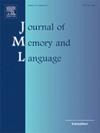Working memory and attentional control abilities predict individual differences in visual long-term memory tasks
IF 3
1区 心理学
Q1 LINGUISTICS
引用次数: 0
Abstract
Working memory predicts cognitive abilities like fluid intelligence (gF) and source memory. This suggests these abilities depend on working memory and attentional control. When attentional resources were occupied by a secondary task, previous research shows that source memory performance is more impaired than recognition memory, implying that working memory abilities exert less influence on recognition memory performance than source memory performance. Here, we directly tested if working memory and attentional control differences predict visual recognition memory performance across four experiments (n = 841 in total). Surprisingly, we found that working memory and attentional control nearly always predicted recognition memory performance as robustly as source memory (Studies 1, 3 and 4), with the exception of when rapid presentation rates exceeded the temporal limits of attention during encoding (Study 2). Additionally, source memory and recognition memory, regardless of encoding presentation rates across experiments, remained highly correlated across individuals. Together, our findings suggest that working memory and attention control resources play a role in performance of both recognition and source memory tests of visual long-term memory.
工作记忆和注意力控制能力预测了视觉长期记忆任务的个体差异
工作记忆预示着认知能力,如流体智力(gF)和源记忆。这表明这些能力依赖于工作记忆和注意力控制。先前的研究表明,当注意力资源被次要任务占用时,源记忆的表现比识别记忆受到更大的损害,这意味着工作记忆能力对识别记忆的影响小于源记忆。在这里,我们直接测试了四个实验(n = 841)中工作记忆和注意控制差异是否预测了视觉识别记忆的表现。令人惊讶的是,我们发现工作记忆和注意力控制几乎总是像源记忆一样预测识别记忆的表现(研究1、3和4),除了在编码过程中快速呈现速度超过注意力的时间限制(研究2)。此外,源记忆和识别记忆,无论在不同的实验中编码呈现率如何,在个体之间仍然高度相关。总之,我们的研究结果表明,工作记忆和注意控制资源在视觉长期记忆的识别和源记忆测试中都起作用。
本文章由计算机程序翻译,如有差异,请以英文原文为准。
求助全文
约1分钟内获得全文
求助全文
来源期刊
CiteScore
8.70
自引率
14.00%
发文量
49
审稿时长
12.7 weeks
期刊介绍:
Articles in the Journal of Memory and Language contribute to the formulation of scientific issues and theories in the areas of memory, language comprehension and production, and cognitive processes. Special emphasis is given to research articles that provide new theoretical insights based on a carefully laid empirical foundation. The journal generally favors articles that provide multiple experiments. In addition, significant theoretical papers without new experimental findings may be published.
The Journal of Memory and Language is a valuable tool for cognitive scientists, including psychologists, linguists, and others interested in memory and learning, language, reading, and speech.
Research Areas include:
• Topics that illuminate aspects of memory or language processing
• Linguistics
• Neuropsychology.

 求助内容:
求助内容: 应助结果提醒方式:
应助结果提醒方式:


